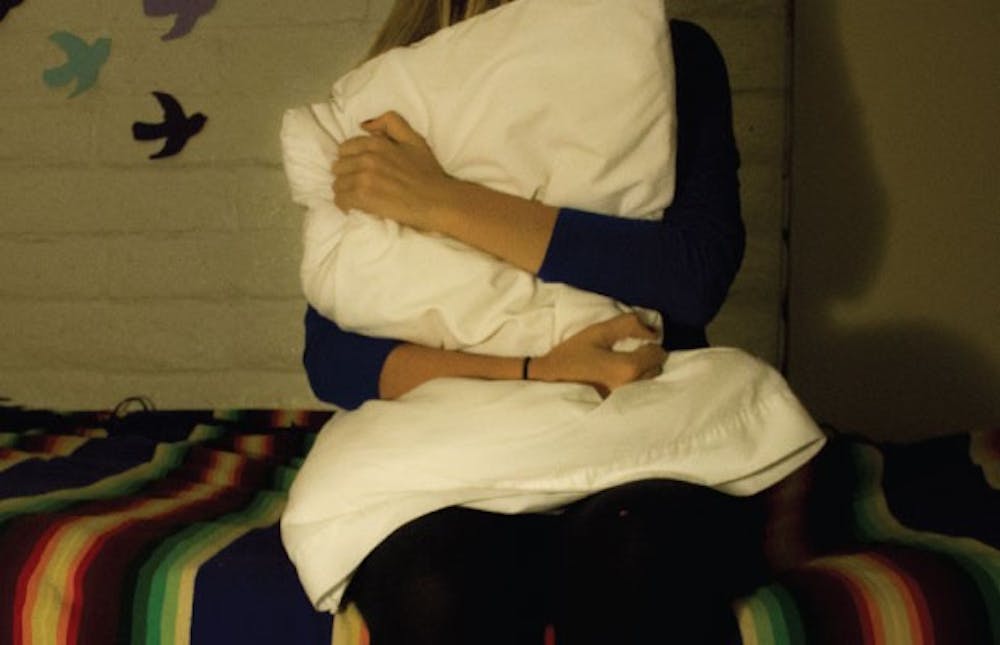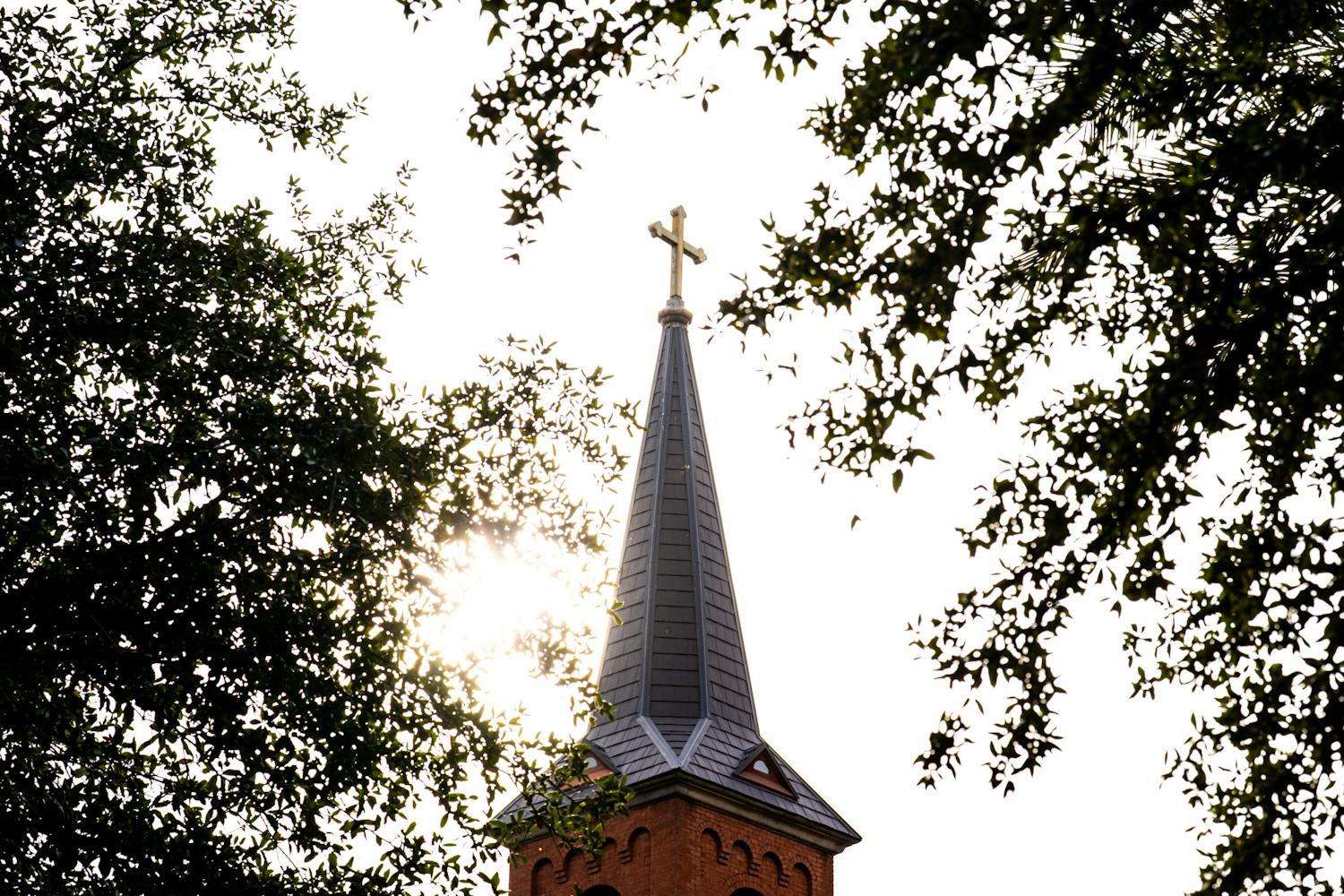 Like A Virgin: A discussion and exploration on what virginity represents today, and whether or not it is a repressed discussion among students at ASU.
Like A Virgin: A discussion and exploration on what virginity represents today, and whether or not it is a repressed discussion among students at ASU.Photo by Noemi Gonzalez
He’s a 21-year-old virgin, who knows what he believes in and sticks with it.
Urban and metropolitan studies junior Connor Descheemaker says although society has embraced sexual liberation, there still remains a lack of understanding that choosing to remain a virgin is still an option.
With tens of thousands of students on campus, how often is sex discussed, observed or evaded?
The perceptions of sex on campus include casual hook ups and, oftentimes, are morphed by messages promoted by the media in movies such as the quintessential “American Pie” or pop culture artists who argue against the norm such as Lady Gaga and Madonna.
For those students who don’t participate in such culture, virginity or abstaining from sex may be viewed as a repressed topic, a topic almost close to taboo.
“I think the stigma associated with being a virgin especially at this campus is huge,” says Tommy, 21, who reacted with a stern “hell no” when asked if he was a virgin and decided to withhold his full name. “People, when they assume, that – when they ask if you’re a virgin it usually means they’re kind of thinking of you as socially awkward; a loser or whatever.”
The topic of virginity leads to a discussion on what virginity even entails, the double standards the media encourages along with the origination of the double standard notion, and the liberation that comes with embracing virginity and sex.
Virginity Defined
Penis. Vagina. Penetration.
This is the idea that society generally accepts as the precursor of losing one’s virginity.
At Fair Trade Coffee, amid the early afternoon wave of customers in downtown Phoenix, 20-year-old Katie-Lee who also chose to withhold her full name, journalism senior Stacey Haynes and Descheemaker bounce ideas back and forth of what virginity means and if that general idea even applies.
“A lot of people limit virginity to penis, vagina, penetration,” Katie-Lee says. “That’s it. However, I have friends I don’t consider virgins anymore because I don’t consider them innocent anymore. I think virginity is just being innocent.”
After a short pause, Katie-Lee poses the question:What about lesbian couples?
“I know people who are in same-sex relationships who have experimented so much that they don’t consider themselves virgins anymore,” she adds.
At the Tempe campus, interdisciplinary studies senior Vincent Guerra and his roommate Tommy discuss the same idea of virginity.
As a male who identifies as gay, Guerra says, “I would say losing your virginity applies to the gay community. But it’s a little bit different. I think oral totally counts.”
For the trans* community, virginity is still something that is experienced.
“In my experience, queer people in general see it as the first time they have sex, which is usually involving genital play of any kind,” writes Ira Bohm-Sanchez in an email. Bohm-Sanchez is a member of the trans* community in Phoenix who teaches trans* sex education to young adults.
Taking the conversation to the opposite end of the virginity spectrum, Tommy and Guerra dive into what the value of sex is.
Sex, Tommy says, comes down to being naked both mentally and physically with someone, with the act ultimately representing a commitment.
“There is a huge emotional and physical connection,” Guerra says. “Part of it is feeling good, but the other part of it is being close to someone.”
For Descheemaker, who is a virgin, sex is about faith.
“It’s a religious conviction,” he says. “I’m a Christian. I believe that that is something I should be saving for marriage, a particular person…. I don’t see why I wouldn’t save that for a person whom I would want to spend the rest of my life with or who I care the most about. That’s certainly not something I believe everyone should have, but it’s something that seems is the right thing to do for my life.”
The factors that contribute to our perceptions of virginity are sometimes based on faith, as the case is with Descheemaker, but also on the influences of our culture and media.
It is within these two channels that arise conflicting views about what a virgin is, who may be a virgin and the labels that follow once the virginity is lost.
Double Standards + Media
Historically, virginity has been a tag associated with females. As in most cultures, the woman played or currently plays the role of the virtuous and dutiful daughter.
Dr. Rosemarie Dombrowski, an English lecturer with a specific interest in Lady Gaga and socio-sexual taboos, says for a better part of the past three centuries, men controlled virginity.
“Ultimately, [virginity] was controlled by men [for] the 18th, 19th, 20th centuries until maybe sometime post-suffrage in the 20th century [when] women started claiming control over their virginity or loss of it,” she says.
Although she believes that men play no role in virginity, she says she does think men can choose to begin partaking in sex acts at any point above consent, just like women can.
“I don’t really think there should be a cross gender determination of that,” she adds. “I can’t see a reason for that.”
But even in today’s society, and on the ASU campus, there is a “dichotomy between the virgin and the whore,” Katie-Lee says. “It’s so stereotypical to say it but it still exists. It’s still here. You can’t get out of it.”
This divide between ideas of virgin and whore go back to the bible and all the way back to Greek Mythology.
In the bible and in the media’s adoption of these allusions, we are presented with the two Mary’s: Virgin Mary and Mary Magdalene, the whore.
“It’s a historical binary,” Dombrowski says. “ It represents the lack of choice, the lack of agency that women have had in ancient society. And that was that women fulfilled one of two roles outside of marriage…they fell into one of two categories: the virgin or the whore.”
Lady Gaga plays with the idea of the virgin and the whore in her “Judas” music video.
“It’s so interesting that Gaga appears as the Mary Magdalene figure in the video and is torn between the Jesus and the Judas figure,” Dombrowski says. “I think she’s attempting to embrace both personas, both the virgin and whore personas in one body.”
Dombrowski calls this progressive. Gaga is embracing a virginal attraction to Jesus and a whorish attraction to Judas, which is something many women face as an option: a sexual attraction they may choose to act upon or not.
In 2010, Lady Gaga opened up about practicing celibacy while writing her album “Born This Way” as a way to restore her artistic life force.
“I think female artists perform sexuality and then are rarely willing to talk about sexuality as it pertains to them or in a confessional way,” she says. “I think there is a really large chasm between performance and reality when it comes to these artists: Miley Cyrus, Lady Gaga, and Madonna for the better part of three decades.”
Gaga’s opening up allowed women to begin thinking why they are engaging in sexual acts, making women pause and question their motivations, says Dombrowski.
For men, though, it appears the media with an “American Pie” outlook on college life in mind, skews the reality of what sex is like, further developing a pressure of how young men should act.
“In the movies, especially in the ‘American Pie’ movie, you think that’s how it’s suppose to be, and it’s really not,” Tommy says.
Guerra says popular shows such “Real World” and “Jersey Shore,” showcase that hooking up is the norm.
“You always hear that it’s so cool from the media,” Guerra adds.
And while some are influenced by beliefs, norms or the media when it comes to sex, there are still those who make the choice to remain abstinent for both conviction and non-religious ideas.
 At an age where sexual liberation is embraced, students receive clashing concepts that encourage the choice of sexual interactions while repressing the alternative choice of remaining a virgin.
At an age where sexual liberation is embraced, students receive clashing concepts that encourage the choice of sexual interactions while repressing the alternative choice of remaining a virgin.Photo by Noemi Gonzalez
Agency: Making a Choice
While the idea of sexual liberation refers to the embrace of sex, the idea of sexual liberation also refers to the idea of agency.
“Once a person, or a group of people or culture is liberated, they celebrate the reclaiming of their agency,” Dombrowski says.
But choosing to remain abstinent for reasons other than moral beliefs has proven to be difficult for Katie-Lee.
“Sexual liberation just comes down to having a choice and others respecting that choice,” she says. “The respecting choice is the hard part because people have made me feel uncomfortable for being a virgin. Or, I’ve been in situations where people suggest to my innocence, and it just makes me feel like virginity is a sin.”
Descheemaker says it is important to understand that virginity is an option on the table, but that it is also not the only option.
Taboo?
Although she enjoys discussing sexuality, whenever peers begin to discuss personal experiences, Katie-Lee changes the subject.
“I don’t want people to desire me in a creepy way just because I’m a virgin,” Katie-Lee says. “If I’m just going to throw out my virginity then I want it to be my choice. And why am I even throwing out my virginity? That’s stupid. We’ve been taught that virginity is this thing on a pedestal. But it’s just the beginning of your sexual journey.”
Descheemaker, however, believes there is a lack of awareness and understanding on asexuality, but he says there is more open discussion on sexuality.
The reason, Descheemaker says, why perhaps the idea of virginity may seem repressed on campus is because, “in college everything is heightened.
“The dominant narrative at ASU is Tempe campus: frat boys, sorority girls,” says Descheemaker. “Anytime you see a stereotype it’s because of the loudest of that group. Each campus has its own dynamics.”
Tommy says that at ASU there is a “score mentality,” leading someone who may be virgin to lie about his or her experience.
“I think it’s related to self-esteem and your self image,” Tommy adds. “My roommates gave me sh-t all the time last year because I wasn’t with anyone last year and they’d say, ‘Oh, he never has anyone over.’ But I just didn’t really care. If you are easily persuaded, have a low self-esteem, low image of yourself …you’re going to be sucked into the score mentality.”
Katie-Lee says the topic is taboo, and that many are focused on hypersexuality.
“What we read and what we watch make it seem like it is normal and it should be perfect every time,” she adds. “And it’s really not perfect every time.”
Do you have thoughts on this subject? Contact the writer at nagonza1@asu.edu or tweet her @NoemiPossible




